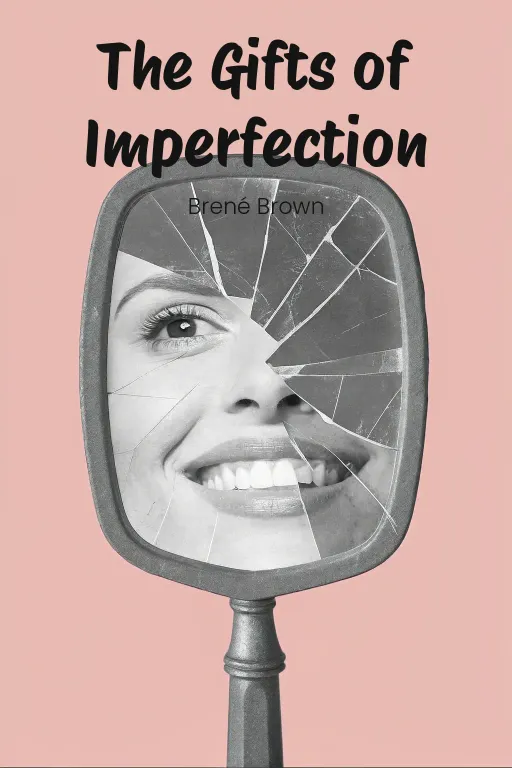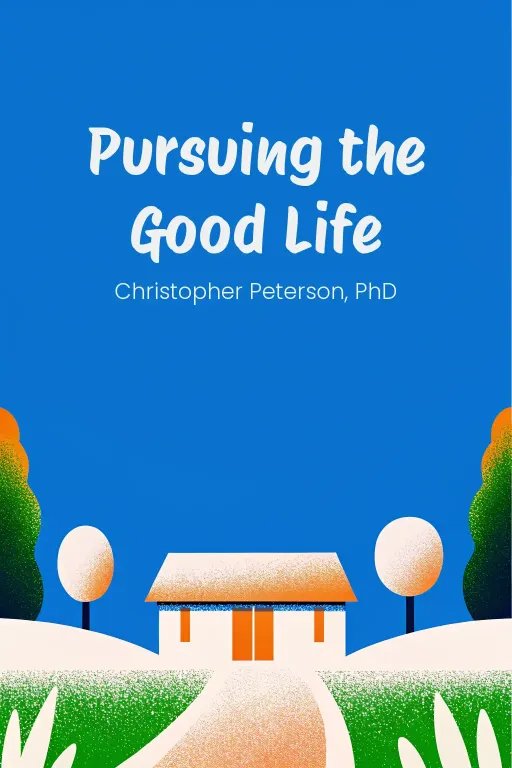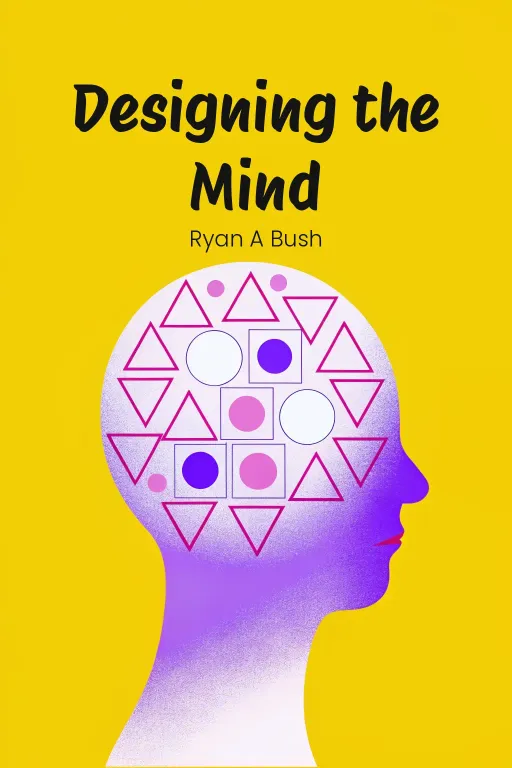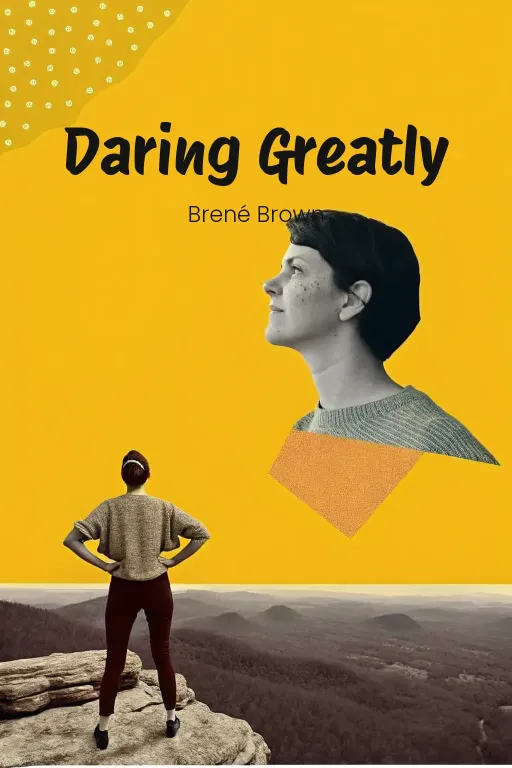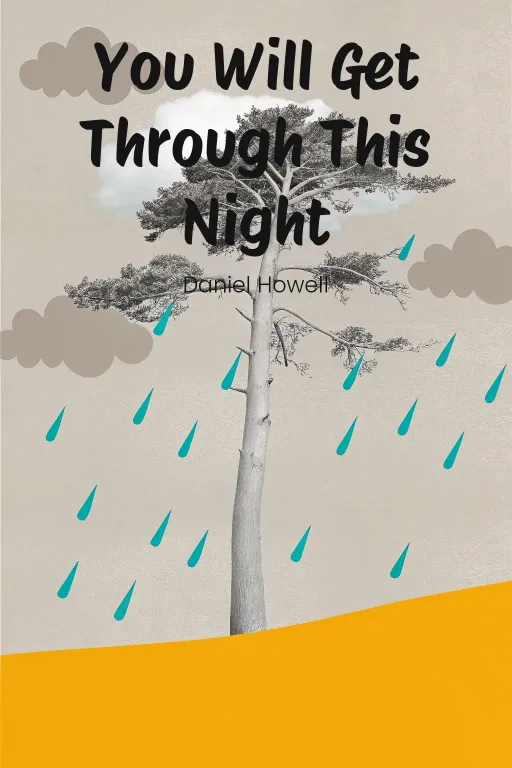
Find Your "Why": Live a Life That Matters
Podcast by Beta You with Alex and Michelle
100 Reflections on Positive Psychology
Introduction
Part 1
Alex: Hey everyone, welcome! Today, we’re getting into something super interesting: what it “really” means to live a good life. I mean, what actually makes you happy, you know? Not just little bursts of joy, but, like, a lasting sense of well-being. Is it your relationships, your job, growing as a person, or something totally different? Michelle: Or maybe it's that perfect iced coffee you have before your crazy day starts—or try to have, anyway. Seriously though, it's a question we all wrestle with. That's why we're diving into this particular book— it's kind of like a manual for finding happiness, meaning, and, dare I say, even purpose in life. Alex: Exactly! We’re talking about Christopher Peterson's Pursuing the Good Life: 100 Reflections on Positive Psychology. It's a fantastic blend of science, personal stories, and practical tips all about figuring out what makes life truly fulfilling. Peterson goes beyond the usual feel-good stuff. He combines solid research with real-world advice, all to help us build lives that actually “mean” something. Michelle: And he's not afraid to debunk common myths about happiness either. It's not all sunshine and rainbows here—the book really digs into happiness, examining it closely. So, Alex, what exactly are we hoping to unpack today? Alex: So, three main things today. First, we'll look at the roots of positive psychology – where did this field come from, and how is it different from just another self-help book? Second, we’ll talk about how to actually use this research in those small, everyday moments. Because let’s be real, real change starts with the little things, right? And finally, we’ll zoom out and look at the bigger picture. What happens when individuals, and even entire societies, start living by these principles of well-being? Michelle: So it’s a three-step journey: understanding the theory, getting practical tools, and then seeing the broader impact. Or, putting it in my terms – starting with why this matters, then how to do it, and finally asking, "Okay, but what does this all “really” mean for us?"
Foundations of Positive Psychology
Part 2
Alex: Okay, let’s dive right into the core of positive psychology . Basically, it’s a pretty big change in how psychology looks at people . For most of the last century, the field really focused on what was wrong with us – diagnosing illnesses, dealing with trauma, fixing problems . Important stuff, definitely, but it mostly ignored, you know, what actually makes life good . Michelle: Right, the idea that just not being miserable doesn't automatically make you happy . It's like thinking a totally average day – no problems, no complaints – is the best life can be . Peterson's basically asking, "Okay, we've dealt with the bad stuff . But what makes people “really” thrive?" Alex: Exactly! That's where positive psychology comes in . Peterson calls it "the scientific study of what makes life most worth living." It's not about pretending everything's perfect or ignoring the bad stuff, but about balancing the whole human experience – the good, the bad, and everything in between . It's about building strengths, being resilient, and living with a purpose . Michelle: It's pretty radical when you think about it . What if we made mental health about more than just "fixing" things, and also about nurturing what's good? But Alex, let's be real – when you first hear "positive psychology," it can sound a bit fluffy, right? Like just another self-help thing . How does Peterson make sure it's actually legit? Alex: Good point, because he's “really” clear that this isn't just theory . It's based on solid, scientific research . He talks about lots of studies that look closely at human flourishing – happiness, resilience, meaningful connections . These studies look at everything from how positive emotions help with recovery to how our relationships affect how satisfied we are with life . Michelle: And some of the findings are super interesting . Like that idea that happiness leads to better health and relationships . But Peterson doesn't make it sound simple either, does he? He warns against oversimplifying happiness, right? Alex: Definitely . He says happiness is always changing – it's not a fixed thing, or a formula . It depends on who you are, your social life, your community, even your culture . And while happiness is linked to good things, it's not some magical solution or a shortcut to success . It's more like a framework for dealing with both the good and the bad times . Michelle: Speaking of context, what about resilience? It's such a buzzword now – bounce back, adapt, all that – but how does positive psychology handle it? Because Peterson seems to think it's not just for "special" people . Alex: Right, resilience isn't this rare superpower . Positive psychology sees it as something we all have, but it needs the right conditions to grow . Studies show that things like hope, joy, and good relationships help build resilience . Peterson mentions that positive emotions and social connections can “really” help people recover from tough times, whether it's loss, work problems, or just everyday stress . Michelle: Okay, but here's a question: are we maybe glorifying resilience too much? Like making it this moral thing – "You should come back from everything stronger!" What if people just... don't? Alex: That's a “really” important point . Positive psychology isn't about forcing yourself to be optimistic – it recognizes that life is hard and we're not perfect . It's more about seeing resilience as a process, not something you perform . It grows over time, especially when people have the support they need to nurture it . Michelle: Okay, Alex, but let's talk about what “really” blew my mind when I was reading this . The idea that we can be wealthy and still unhappy . How can we be struggling to find happiness in such rich societies? Alex: Yeah, it almost doesn’t make sense, right? Peterson explores this, showing how money and success don’t always equal happiness . In fact, they can actually make it harder to enjoy the simple things . He talks about a study where people who were reminded of wealth – even subtly – actually enjoyed chocolate less than those who weren't . Michelle: That's crazy . The idea that wealth can make us enjoy things less . But it makes sense, doesn't it? If you're always surrounded by abundance, it's easy to take things for granted . Like, why care about one piece of chocolate when you know you have a whole box? Alex: Exactly! That's why Peterson talks about things like gratitude and savoring – simple but powerful ways to reconnect with the joys of everyday life . Gratitude helps us focus on what we have instead of what we lack, while savoring is about slowing down and “really” appreciating a moment, whether it's a meal, a conversation, or just breathing fresh air . Michelle: But here's the thing – how do you convince people to slow down and savor when everything around us tells us to do the opposite? Hustle, compete, accumulate . It's like we're programmed to chase goals, not stop and watch the sunset . Alex: That's where Peterson takes the conversation to a bigger level, talking about society . He criticizes how our culture focuses on materialism and personal ambition, often at the expense of community, kindness, and helping others . He identifies four areas for a good life: work, love, play, and service . Together, they encourage living intentionally, having meaningful relationships, and giving back – which are key to both personal and societal well-being . Michelle: I like that framework a lot . It's a way to balance your life across these different areas, rather than just focusing on, like, career success . It's like, how good is "winning" if you have no one to share it with or no real reason for winning in the first place? Alex: Exactly . Positive psychology isn't just about individual happiness – it's about creating well-being on a larger scale . The good life, as Peterson sees it, is more than just what you achieve for yourself . It's about joy, connection, and contributing to something bigger .
Practical Applications for Well-Being
Part 3
Alex: So, Michelle, now that we've laid the groundwork, let's dive into the practical side. How do we actually weave these principles into our daily lives? This is where the rubber meets the road, right? Michelle: Precisely! Theory is all well and good, but what about the actionable steps? Give us the "how-to" guide to a better life. Because, let's be honest, without practical application, these concepts just remain abstract ideas. Alex: Absolutely! Let’s start with gratitude. Peterson emphasizes its importance in positive psychology, and for good reason. It's more than just good manners, it's a mindset shift. Michelle: Yeah, not just a polite nod to the cashier, more like a deep rewiring of how we see things. So, tell me more. Alex: Exactly! It's about deliberately focusing on what we do have, instead of dwelling on what we lack. When we intentionally acknowledge the good things, even the small ones, we experience real, tangible shifts in our emotional state. Michelle: So, it's not just about being nice, you're actually reprogramming your brain? I remember you mentioning a study about middle school students and gratitude journals, what was that about? Alex: It was fascinating! Researchers discovered that when middle schoolers regularly wrote about things they were grateful for—a supportive friend, a kind gesture—their social relationships blossomed. Michelle: Seriously? Like, sleepaway-camp-friendship-bracelet blossomed? Alex: Almost! They felt more connected, more valued by their peers and teachers. And even better, their overall satisfaction with life shot up! Gratitude wasn't just a feel-good exercise; it reshaped how they interacted with the world. Michelle: So that's a ripple effect! Gratitude boosts relationships, relationships boost happiness, and happiness fuels more gratitude. Nice little feedback loop there. But, playing devil's advocate, what happens when things get tough? Practicing gratitude sounds…daunting when you're going through a really rough patch. Alex: That's a valid point. Peterson stresses that gratitude isn’t about pretending everything's perfect or forcing a smile when you're hurting. It's about finding even the smallest glimmers of light amidst the darkness. Michelle: Okay, so not toxic positivity. Alex: Not at all. Think of Lionel Hampton's quote: “Gratitude is when memory is stored in the heart, not the mind.” It’s about recognizing the deeper layers of our lives - love, resilience, simply existing. And letting those insights carry us. Michelle: I see, it's less "stop complaining and count your blessings" and more "acknowledge what sustains you, even when things are difficult." Alright, what about savoring? It sounds similar to gratitude, but I sense a difference. Alex: You're right! While gratitude is often reflective—looking back or around to appreciate what you have—savoring is about actively immersing yourself in the present moment. Michelle: The taste of the coffee, the warmth of the sun. Gotcha. Alex: Exactly! Peterson calls it an antidote to our fast-paced, goal-driven lives. It's the conscious enjoyment of all of life's little pleasures. Michelle: Because let's face it, we're all guilty of chasing the next milestone – promotion, raise, whatever – and completely forgetting to savor the journey. We all know someone who has it all – the house, the car, the job – but they’re miserable. How does savoring help with all that? Alex: Peterson says savoring it forces us to slow down and become present. He mentions research shows that people who make it a daily habit report higher levels of happiness and satisfaction. Michelle: So, actively smelling the roses, not just Instagramming them. Alex: That’s right! Think of the saying, “Enjoy the little things, for one day you may realize they were the big things.” Savoring solidifies those little joys into meaningful memories. It’s a counterbalance to constantly chasing wealth, status, and external validation. Michelle: Easier said than done, though, right? Our culture is all about the hustle – you're not "winning" if you're not doing. Savoring almost feels… countercultural. Alex: It absolutely is, Michelle. And that's why Peterson emphasizes the importance of balance—finding harmony between work, love, play, and service. Michelle: Finding “the Force,” you might say? Okay, keep going. Alex: When one of these areas dominates, it throws everything else off. Too much work can damage relationships, while too much fun without purpose can lead to emptiness. Peterson “really” highlights how these areas are intertwined, and how the goal is to engage with all of them intentionally. Michelle: Service is particularly interesting to me. The idea that giving —your time, skills, anything— actually boosts your own well-being? That feels counterintuitive in a world that tells us to hoard our resources. Alex: Exactly! And yet, study after study shows that acts of service bring the most profound sense of purpose and fulfillment. It’s a fantastic paradox: the more selflessly you give, the more fulfilled you become! Michelle: So you get more by giving more. Sounds divine. Alex: Right? Whether it’s volunteering, mentoring, just lending a hand to a friend, contributing to something bigger than yourself boosts your own sense of belonging and self-worth. Michelle: So, we're talking about connection. Gratitude, savoring, love, service - they all come back to connecting with something larger than ourselves. Individual well-being is inseparable from the collective. Resilience, happiness – it all happens in the context of relationships, right? Alex: Exactly! And Peterson makes that crystal clear. You can't build a thriving life in isolation—it’s nurtured through community. Michelle: Like a bonsai tree expertly shaped by a steady hand. Alex: Precisely! Strong social networks act as our safety nets, giving us the support we need to weather challenges and find joy. So, while a good life starts with personal reflection and action, its real power unlocks when we extend it outwards, to other people.
Broader Perspectives on Happiness and Legacy
Part 4
Alex: So, with these tools in hand, we can really start to explore what these practices mean for society and for us as individuals. This is where it all comes together, Michelle – the big picture stuff. We’re talking about how our personal well-being is connected to society. Also, what is the legacy that we leave behind? Michelle: Awesome! So, we’re zooming out from, "What makes “me” happy?" to, "How do the place I live, the culture I’m part of, and the purpose that I have shape this happiness?" And even bigger than that – what kind of mark do I leave on the world when it’s all said and done? Alex: Precisely! This part widens the scope to see how things like geography, government policies, legacy, and cultural stories all affect happiness. It's about going from "me" to society, and from just feeling good now to having a sense of long-term meaning. Michelle: Alright, let’s jump in with something I was thinking about: geography. How much does “where” you live really matter for your happiness, anyway? Alex: It's huge, actually. Peterson stresses that how we feel isn't just about what we choose, but also about the places we're in. Think about city versus country living. Cities might be full of possibilities—jobs, fun stuff, education—but they can also be isolating, polluted, and crazy stressful. Meanwhile, the countryside might be peaceful with close communities but lack things like good healthcare or job opportunities. Each has its pros and cons. Michelle: And yet, some countries, like Denmark and Finland, always seem to be at the top of the happiness lists. What are they doing that's so different? Alex: It really comes down to how their societies are set up. They put well-being first in very real, systematic ways. Denmark, for example, has great public services – affordable childcare, long parental leave, healthcare for everyone. These things take away some of the daily stress, so people can focus on what’s really important, like their families, what they love doing, and their communities. It's not about getting rid of problems, but giving people the tools to handle them and live well. Michelle: And these kinds of policies don’t just help people one by one, but they spread out. Good city planning, things like more green spaces or walkable neighborhoods, help everyone. I mean, it’s hard not to feel good when you're in a city with parks and paths that make you want to slow down, get outside, and actually meet your neighbors, right? Alex: Exactly. Peterson mentions that when governments invest in things like this, they create spaces where people can relax and connect. That’s why happiness isn’t just about what you do yourself. It’s also about the infrastructure and policies which shape our everyday lives. So, governments have a big role in making sure everyone has access and opportunities. When they do, you see the results – people are happier, communities are stronger, and there's less stress all around. Michelle: But do you think that approach is possible everywhere? Could every country just copy the “Denmark model”? Or do cultural differences make that difficult? Alex: That’s a good point. Some things, like green spaces or work-life balance policies, can work across different cultures. But other things are closely linked to a society's values. For example, Scandinavian cultures really focus on community well-being, and that affects how their policies are made. But even with different systems, the message is clear: government policies greatly affect happiness by giving people the basics – security, health, opportunities – and the freedom to find what makes them happy. Michelle: Okay, let’s switch gears. What about legacy? What does happiness have to do with the mark we leave on the world? Alex: Everything, really. Legacy and purpose are deeply connected to fulfillment. Peterson highlights people like Steve Jobs and Randy Pausch to show how making a difference and contributing to others goes way beyond just personal happiness. Steve Jobs, for example – it wasn’t just about the products he created. His whole journey like dropping out of college and exploring calligraphy, shows how important it is to trust that our experiences will eventually come together to mean something. His message? Follow your curiosity and don’t be afraid of mistakes, because they often lead to breakthroughs. Michelle: And then there’s Randy Pausch – what a legacy. Here's a guy facing the end of his life, and still, instead of being sad, he gave this amazing "Last Lecture" that has become a guide for living authentically and with purpose. That "play the hand you’re dealt" attitude? It’s the best example of resilience and intention. Alex: Exactly, and they both saw setbacks not as failures, but as part of their story. That perspective – that meaning-making – is key to happiness. Peterson argues that legacy isn’t just about huge achievements; it’s about the values, passions, and insights you share with others. Your actions create a ripple effect, touching lives beyond your own. Michelle: So it’s not just, “What do I get from life?” but “What do I give to it?" And that changes the focus from short-term fun to long-term fulfillment for yourself and others. Alex: Right. And that leads to some of Peterson’s thoughts on society. Modern society often pushes shallow goals – like the bucket list idea, where happiness becomes a checklist of Instagram-worthy moments. But those quick wins don’t always lead to real satisfaction. Michelle: Yeah, the “bucket list” thing really hit me. Are we chasing real experiences or just ticking boxes? I mean, does skydiving do more for your happiness than, say, really connecting with someone? Peterson seems to think that strong relationships and thinking deeply offer much greater rewards. Alex: Absolutely, and he also talks about how we’ve traded deep, thoughtful communication for convenience. Think about letter writing – it used to be a great way to really express yourself. Now it’s all texts and DMs, which, while fast, often lack the depth that builds lasting relationships. Michelle: And then you add in the constant pressure to be positive – especially on social media. Everyone has to look like they’re thriving all the time. It’s exhausting, honestly. Alex: It really is. Peterson points out that denying negative emotions – sadness, failure, even boredom – actually prevents personal growth. True happiness includes the full range of human experience, understanding that the lows as well as the highs contribute to a full, authentic life. Michelle: So the main thing is to shift our focus from “flashy” happiness – wealth, achievements, public image – to something more sustainable. Real relationships. Purposeful actions. Finding depth in the middle of distractions. Alex: Exactly. Because happiness, in Peterson’s view, isn’t a competition or an image – it’s a practice. And more than that, it’s collective. Living well doesn’t happen alone. It’s connected to giving back, connecting with others, and creating environments where others can flourish with us.
Conclusion
Part 5
Alex: Okay, let’s bring this episode to a close. Today, we really got into the core of positive psychology, didn't we? It's so cool how it zooms in on what makes us thrive, instead of just patching us up when we're down. We looked at how it flips the script to focus on what really makes life worthwhile—like building resilience, practicing gratitude, and creating genuine connections. Basically, it's about finding that sweet spot between growing as individuals, contributing to society, and living with intention. Michelle: Yeah, and we didn't sugarcoat the challenges either. We talked about how modern life sometimes throws a wrench into these ideas, with all the focus on stuff, getting things done, and that highlight-reel kind of happiness, right? But, like, Peterson points out, real fulfillment comes from facing the music of life, not just posting the perfect picture. It’s about tweaking our surroundings, our relationships, and ourselves to really feed that deeper sense of meaning. Alex: Exactly! Which brings us to a little challenge for our listeners this week. Take a moment, just pause and ask yourself: What tiny habits can you add that'll sprinkle more meaning into your daily grind? Maybe it’s just relishing a quiet moment with your coffee, or reaching out to someone you care about, or finding a simple way to give back in your neighborhood. Remember, the good life isn't about huge, dramatic gestures or being mistake-free. It’s a daily thing—being present, having a purpose, and connecting with others. Michelle: And while you're at it, here's something else to chew on: What kind of footprint are you leaving behind? Because living well isn’t just about today; it’s about building something that lasts. It's the thankfulness you show, the bonds you strengthen, and the purpose you create that’ll resonate long after you’re gone, you know? Alex: Couldn't agree more. Thanks so much for joining us on this journey into “Pursuing the Good Life”. We really hope you’ve walked away with some food for thought and some actionable ideas. Until our next chat, keep pushing yourselves to live on purpose, share freely, and really savor every moment. Michelle: Catch you all next time!


